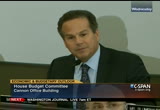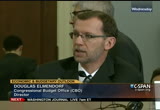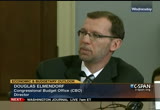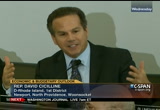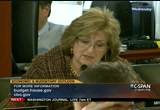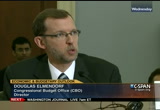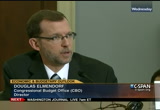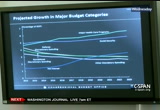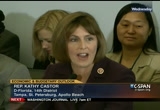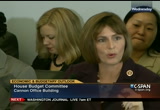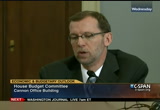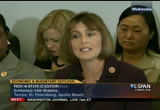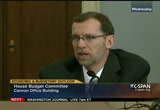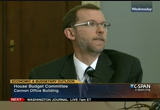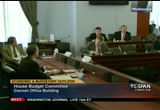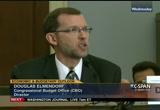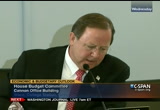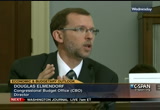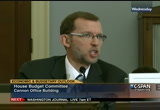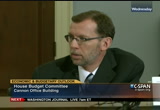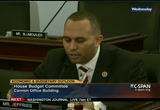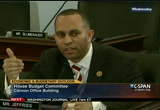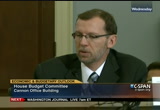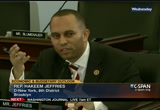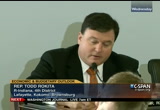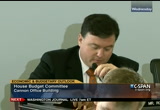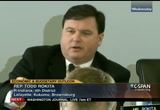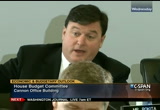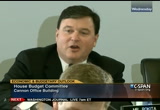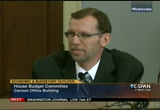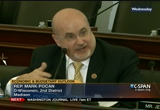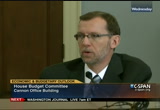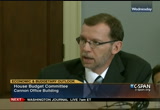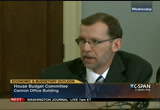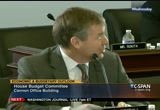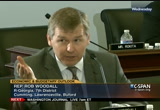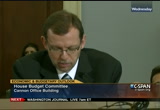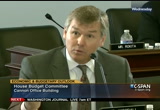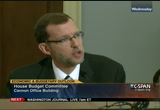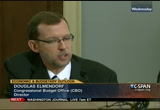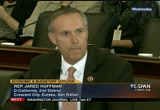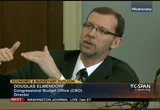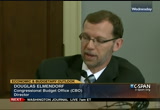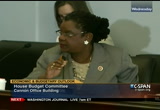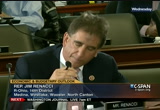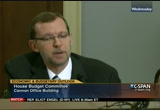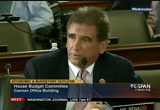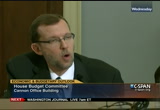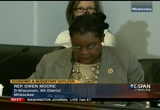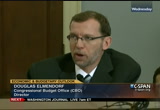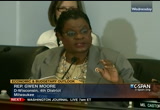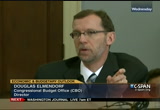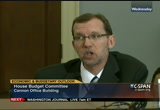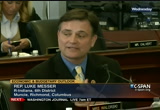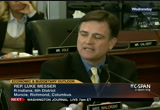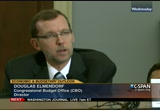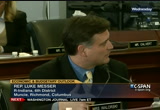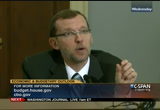tv Capitol Hill Hearings CSPAN February 14, 2013 6:00am-7:00am EST
6:00 am
said said $1,200 in new spending opportunities for families and provide substantial economic relief to stabilize the housing market and it would be a huge generator in terms of job creation and speak to those two issues. >> when we talk about bang for the buck, sometimes we talk about it in the short-term context and the answers can be different. in the short-term, what matters most is how much of the extra dollar of government spending or how much of the lost dollar of taxes is spent and how quickly it's spent. giving more money to spending increases or tax cuts to lower- income people is more huge effee because they tend to spend a larger share of the difference. infrastructure spending, a lot of that gets spent, but depending on the project, it may get spent somewhat slowly. it can have a high bang for the buck ultimately but not right now. certain projects take a while to get started. infrastructure investment, if devoted to high return projects, can, in fact, have a big effect on the state of the
6:01 am
economy. about half of nondefense discretionary spending can be viewed as investments either in physical structures or in people in the form of education and training. not all that money is spent well. but some of it is clearly spent for things that the private sector would not otherwise provide. and some of those projects can then have high rates of return and boost the economy in significant ways over time. i think the -- one concern that people have raised about the cutbacks in discretionary spending as a share of g.d.p. that are in place under the sequester but even under the original cast, people have expressed concern that can end up limiting the investment that the federal government does, but it's hard to know for sure because your colleagues haven't made specific choices yet. on helping to refinance, i don't know precisely what his proposal is.
6:02 am
we will see that when he releases his budget, we have done analysis of different ways of encouraging more refinancing. and that could have a positive effect on the economy. in addition to helping those households, the overall effect depends on how many households refinances. who is eligible. what the incentives are to households and to the lenders to do something differently. but dollar for dollar it can be effective as we reported about a year or so ago. >> when you say depends on the amount, more americans who are able to take advantage of it, easy program to administer, lots of eligible americans, it will have a greater and more positive impact? >> yes. >> the gentlelady from tennessee, ms. black. >> thank you for being here
6:03 am
today and i can thank you for this budget outlook but as you read through it, certainly bring up a lot of concerns about where we're going and the huge challenges that we'll expect going down the road. i made some notes where a lot of things are unsustainable. social security is unsustainable and without reform it will go bankrupt in 2033. medicare is unsustainable. hospital insurance trust funds in 2023. social security disability insurance which we don't talk much about and this is an important topic that i would love to see this committee take a look at because i got concerned about this last year. it will go bankrupt in 2016, a big concern and then on the education side, pell grants, $1 billion shortfall in f.y. 2015 and annual shortfalls of $5
6:04 am
billion from f.y. 2016 through 2023. all of these programs, it's very scary to see they are going to go bankrupt unless we have some form of reform. let me now turn to look at the health care issue, because c.b.o. cites that rising health care costs as the leading driver of our debts and our deficits and the federal exchange subsidies alone are expected to cost $1 opinion.2 trillion and medicaid expansions are expected to reach $26.8 billion. first of all, the affordable -- 600 its $30 billion. -- $638 billion. entitlement spending. here we go, more entitlement spending. will this increase in spending
6:05 am
with the medicaid expansions and the new exchange subsidies reduce health care costs growth as we look at the growth down the road? >> the affordable care act had a number of different pieces. the expansion of insurance coverage, we now estimates will cost $1.3 trillion over the 2013-2023 period. >> let me interrupt you there and make sure i understand, $1.3 trillion more than what was anticipated in previous outlooks of the program, is that correct? >> i'm saying that the costs of the coverage expansion relative to a world that did not have that coverage expansion. extra costs of $1.3 trillion. we have had many changes to the coverage expansion but netted out to very little change on balance for any given period of years.
6:06 am
our estimates through 2019 are now actually slightly below what they were when we first estimated the effects of that expansion three years ago. as one moves the budget window further along, one has to look at larger numbers for this expansion and all existing federal programs and for tax revenue because the economy is growing over time. this particular part of the law raises federal costs in order to subsidize health insurance for people in particular ways. the law incrudes changes to medicare that has the effect of bringing down the growth rate of medicare spending over time. taking those pieces together, the law has increased the federal government's budgetary commitment to health care in the long run because ultimately those coverage expansiones -- the law as a whole includes changes in tax provisions. but the government commitment
6:07 am
to health care is increased because of the affordable care act. how those medicare changes will affect the growth of medicare spending, we made our best estimate of, but it is an uncertain business. and whether the changes would spill over to the private sector, we don't know either. we have not offered a view about whether -- and we don't do estimates of total health expenditures. we try to focus on what we have done and said. >> and all of this -- and i brought the chart up that you were referencing, the major health care programs are the greatest amount of money that is spent in any one time and we are showing that it does grow, doesn't come down and doesn't curve down or level out. it continues to grow. and yet despite this and this is the point i want to make at the end of the day.
6:08 am
we know that there are going to be people out there, more people that will be uninsured than previously unexpected because there are a lot of dynamics that reaction. >> we project that the law will greatly reduce the number of uninsured americans. >> my apologies to ms. castor. >> thank you for being here today and sharing your economic budget outlook. i think there are positive signs that should not be overlooked that our economy is growing and we are adding jobs. that's consistent with what i have seen back home in florida. there is greater construction work and more cranes popping up across town. housing prices are up. if you are a seller, that is
6:09 am
pretty good news. we have seen a significant drop in unemployment. the tourism has rebounded after the b.p. disaster and if you are fortunate to have money in the stock market, you have done very well. if we had more people wrking would our debt and deficit be largely improved and you said yes and i assume you believe this is still the case. >> yes. >> but it seems like we have significant headwinds to getting past that $7.5% unemployment rate and in your outlook you said you don't see great improvement there in the near term. so talk about the headwind to greater employment across the economy, especially, what is in the control of the congress? what are the current policies that are in place that prevent
6:10 am
us from lowering that unemployment rate? >> congresswoman, i think you described well a number of the factors that we see underlying factors that are leading to economic growth. but as we've said, we think that the remaining parts of what had been the fiscal cliff, the remaining parts are still a damper to economic growth this year and one of the things that congress might do to boost economic growth this year is to not let that fiscal tightening take effect. >> the sequester? >> there are a number of pieces to that, but one crucial piece is the sequester and if the congress were to not have the sequester, then that would strengthen output this year and would lead to 750,000 more jobs in the fourth quarter. at the same time, if there aren't offsetting changes made later, the extra debt would be a drag on the economy medium
6:11 am
term and long-term. >> that's what i'm hearing from folks at home, major employers. we have a large port. if we reduce infrastructure spending, they anticipate cutbacks and private businesses especially. large research university, they rely on innovation, science and medical research along with the cancer research institute, very significant damage to what they're doing, but loss of jobs, large school district, ninth largest in the country and large air force base, civilian work force projection. colleagues, we really -- time is short. and i think what we're hearing today, if we want to address the debt and deficit, let's not do this to ourselves, let's not self-inflict a wound that will put us back farther, bigger and
6:12 am
deeper on deficit and debt reduction. i think this is a warning sign and dr. elmendorf is being very clear with us that we have to work together and replace the sequester. doesn't mean we are going to shirk our responsibility to address the long-term debt, the medium-term debt but if we are going to be stuck with this 7 1/2% unemployment rate, that is not sustainable. are there other policies that could help us that are within the control of the congress to create more jobs? categories. there are a number of changes in fiscal policy. higher spending or lower taxes than are under current law and as you know, few reports in the past few years of trying to evaluate the bang for the buck
6:13 am
of different sorts of changes in tax and spending policy. turning off the sequester would be one item. >> did you also mention immigration in your outlook? the outlook. we have done other work. i think immigration can be -- more immigration can be a positive force for the economy in the medium term and long- term depending on what the reforms are that consider might consider. those are reforms that wouldn't take effect that would provide a big boost in the economy this year and next year. in terms of changes in fiscal policy, there is certainty about what it would help. flores. >> thank you for joining us again. let's talk about a different subject for a minute. when you looked at the president's budget from last year, can you tell me when that budget balanced?
6:14 am
>> in our estimate of it, congressman, it never reached a balanced budget. >> and what would be -- would you say that the spending and revenue profile in that budget was one that would help create a sustainable economy? >> well, congressman, we did think the economy would be sustained, yes. so we did an analysis of the economic effects of that budget. we think the economy would be growing. but as i have said on many occasions, a path that had less government debt would by the end of the decade would lead to a stronger economy. >> even by its own admission said the debt beyond the 10- year level is going to reach unsustainable levels and the economy would suffer. what would the economic impact be if we raise taxes by $85 billion by the end of this fiscal year, having an $85
6:15 am
billion cut due to the sequester that also starts on march 1? nature of the tax increase. bylet's assume it is done tax rate increases. >> it is dependent on whose tax rates were cut. but in general -- >> on the top 1% again that includes small business owners. replaced by an avifflet equivalent dollar amount, that would be an improvement for the economy because we think the pro pencity to spend would be smaller dollar for dollar than the spending -- >> the lady on the corner that owns the dry cleaning store who has her taxes increased dramatically is going to invest as much in the economy and continue with expansion plans that she had prior to that tax increase?
6:16 am
>> i think, congressman, that the lady on the corner would find that people would come in with dry cleaning if they were the people who were working for the government or working in government contracts of the sort that would be increased by taking away the sequester. i'm not trying to play a game but that is the effect we have in mind. what businesses are most for their products. >> under that line of thinking, what you do is raise the taxes to 100% on high-income people and spend all their money on government contracts? rhetorical. how do you measure the strength of this economy over the last four years as opposed to post- world war ii. >> weaker. >> how does it compare to the recovery of 1988 through 1993?
6:17 am
>> this has been a much weaker early 1980's. >> what was the 10-year cost of the affordable care act -- your cost estimates? >> deficit impact was a slight deficit reduction. the costs of the coverage expansion may be what you are referring to over the 10-year window at the time. hand. the number of that and the cost of coverage expansion over 10 years we think would be smaller by a little bit than we thought at the time, but the budget window, the 10 years we provide projections for has moved out to 2023 and increases the current 10-year costs. >> and and again, switching subjects for a minute, does the
6:18 am
c.b.o. look at unfunded obligations like what the acktue article obligations are of medicaid? does c.b.o. look at those? >> yes, long-term budget outlook, we include the costs of those programs and comments on the social security trust fund. >> you discount those back and say this is what the net unfunded obligation is for social security today? >> yes, we do, congressman. >> do you have the numbers off the top of your head? but it is substantial. >> trillions of dollars between social security and medicare, correct? >> that's correct. we talked about this as a share of g.d.p. because that is a way economy. expired. the gentleman from new york. mr. jeffries. >> with you are asked whether this has been a morrow bus or weaker recovery as opposed to
6:19 am
after world war ii and you recovery? >> yes. >> in 2008, this country confronted the worst economic crisis and collapse that we have experienced in the history of the republic with the exception of the great depression? >> yes, that's right, congressman. >> and the economy since 2009 under this administration is moving in the right direction based on any reasonable objective, economic measure, wouldn't that be correct? >> g.d.p. has been growing since the summer of that year, yes, congressman. >> let's look at some other numbers, six million private sector jobs have been created? >> i think so. depends on the point on on which you start that tally. >> than and i believe 500,000 manufacturing jobs have been created? >> that may be, i don't know that off hand.
6:20 am
>> the unemployment rate is at or near its lowest levels than the last four years? >> i think that's right. >> home prices are rising at the fastest pace than in the last six years? >> yes. >> home purchases are rising at 50%. >> they are rising. >> we reduced the deficit by $2.5 trillion in the last several years. >> we try not to do a calculation like that. how much has been accomplished depends on the point of time and the benchmark one is comparing to. we have not done that calculation ourselves. >> based on any reasonable economic measure, the economy's clearly moving in the right direction. the question has been asked a few times today, is there any economic benefits to balancing the budget. i would like to ask a different question, is there any economic benefit to stimulating economic growth in the country at this moment in time?
6:21 am
>> yes, there is. >> what would be the best way in your estimation as you examine this question to stimulate economic growth? >> the ultimate choices depend on people's choices as to what the government should be or should not be doing. cuts in taxes or increasing in spending that put money in the people's hands where it is spent quickly can provide a crucial boost to the demand for goods and services encourage businesses to hire workers and gives them income and allows them to spend more. >> you have indicated that the best way to increase consumer demand is to make sure we increase the amount of money that is placed into the hands of low-income or modest americans? >> in terms of the bang for the buck. lower-income spend the greater share. >> do you think it would be reasonable to conclude that an increase in the minimum wage has been advocated by others
6:22 am
which would therefore place a greater dre of money in the hands of low-income or modest new yorkers would increase to demand and therefore be good for the economy? >> we have not studied a particular increase in the minimum wage. there are various aspects at work. some people could get paid more and would presumably spend. also true, we think there would be small reduction in if employment because the cost of workers would go up. we have not tried to work through those effects or others. it also, of course, depends on how much the minimum wage is increased and how the increase compares to what is the current minimum wage in many states. there is a different minimum wages. >> and the reductions we could face in the short-term would be to allow the sequestration to take place, we would lose 650,000 jobs?
6:23 am
>> of the things that are about to happen under current law that you all talk about a lot, the sequester, taking it away would have an output and jobs. >> mentioned a loss of confidence in the government's ability to manage its affairs could trigger sort of more and would presumably spend. fiscal crisis where our ability to borrow at aforwardable rates is reduced? >> yes. >> confronting a fiscal cliff in january, potential debt ceiling dault, in march, sequestration, government shutdown -- could this shake the confidence of some investors and our ability to deal with our responsibility? >> yes, congressman, we think
6:24 am
that perennial crisis mode of fiscal policy over the past few years is reducing people's confidence. how big an effect that is, we don't know. >> the gentleman's time has expired. >> thank you, chair and thank you for being back with us. by anyone's objective measure, we would consider you a smart and intelligent man and a good economist. >> thank you, congressman. >> it strikes me that some of us want to speechify rather than use this precious time to engage you in conversation. for the record, i really appreciate that line of questioning. i will try to continue on in that regard. speaking of speechifying, we heard it is impossible to get ourselves out of this debt
6:25 am
situation through spending cuts alone. i want to understand, that if i am correct, that the cbo projects that revenue will double from 2012 levels to $5 trillion in 2023 basnight yes. >> and revenues will grow by $259 billion? >> yes, congressman. >> according to your report, revenues have averaged just under 18% of the economy in recent history. am i correct that you project that revenues will rise over 19%? >> yes, congressman. >> even -- is that above historic levels? >> if yes, congressman. >> in a letter you wrote to john been a last year, you cited the affordable care act and that
6:26 am
will increase revenues by $1 trillion? >> yes, congressman, and that's because why? >> because the law included a number of changes in taxes that collect more money. >> i think most people were focused on the tax increases that have higher income taxpayers. am i correct that the payroll tax holiday expired despite the fiscal cliff deal not being included -- what you talked about in your opening remarks about the public debt -- interject if i have these numbers wrong -- the public that was 76% of our gross domestic product, act and that will increase revenues by $1 the whole country generates and one-year. >> our projections, yes. >> 76% -- that is not the whole picture, right? to go through the definition of public debt and why it might be higher, if you include what is missing from the social security trust fund, etc. >> in addition to the debt that
6:27 am
is held by private citizens here and abroad and the federal reserve system, there's a substantial amount of government debt held by other government accounts and the largest of which is the social security trust fund. that debt is honest to goodness government debt. we don't included in debt measures nor do most analysts because we look at the government as a unified whole. we do projections of future spending, we take account of future entitlements. we capture the future obligations of those programs under current law in the way we do our projections. when we look at the debt, we look at what the government owes in total. >> you don't calculate that debt until becomes do? -- until it becomes due? >> we actually produce projections of this gross debt but we don't focus on its.
6:28 am
>> if i wanted to include the social security trust fund in my remarks, what would be the debt to gdp ratio? >> i'm sorry, i don't know that. >> would be over 100%? >> that is possible. >> when i started my questions, i complimented you about how smart you work relative to me. take this in that vein -- if i was taking your credit card application, your personal 1 and under the question occupation, would be plausible to tell me that you are an economist? >> yes, congressman. >> you are familiar with the austrian school. >> you and i discussed this before. >> which one do you prefer? >which school? [laughter] >> i think the consensus view in
6:29 am
economics is that when -- what people think of as keynesian economics, the answer is important questions about what will happen in the economy and when unemployment is high but the consensus also thinks that over the medium and long term, when unemployment is not so high, we think of neo-classic economics. >> thank you very much. >> gentleman from wisconsin -- >> is a pleasure to be on the committee, especially with someone from wisconsin. mr. ryan and a share a county back home. one of the top priorities that i look at is how we can create more jobs right now to get things going and that is the
6:30 am
best way to get out of the deficit situation. before being here and watching the news, it seems like all they ever talk about his deficit reduction as the economic plan as if congress cannot walk and chew gum and i think we can do both. how we grow the economy to help create we had to approve every stimulus dollar that came through with constantine congress. i heard from small business owners who benefited from it. we had the road and the -- roadbuilding and construction industries. not your most verbal entities. 54,000 jobs were saved or created in wisconsin. next to the stimulus dollars -- thanks to the stimulus dollars. i look at what the president
6:31 am
said about investing back again. i saw a release from speaker boehner yesterday. he said in his release tonight he offered them a little than the same stimulus policies that have failed to fix our economy and put americans back to work. his concert is unique because we good-- wisconsin has yo values. i believe the cbo has done a report on the of fax. is it unique to wisconsin or total job increases across the country because of those investments? >> there were more jobs and more output produced because of the recovery act. >> what number? >> it varies because the spending and the tax reductions
6:32 am
from the recovery act have varied. at the peak affect of the act, 11, half a million and three point 5 million. >> were there additional jobs since then? >> there continued to be more employment. most of the money from that has been spent. the effects are dwindling. >> eight reduce the unemployment rate during that time. how about the affect on economic growth? >> it boosted economic growth in 2009 and 2010 by considerable extent and brought down the unemployment rate in 2010 and 2011. >> as we look at what we are talking about, so often people talk about raising taxes or
6:33 am
cutting spending. those are the only alternatives. maybe in washington, those are. for those of us who come from the heartland, i have had a small business since i have had hair. i come from a different perspective. it does seem there is another way. if we can increase evil getting to work in getting jobs and if they are paying taxes, that trajectory we saw on spending is the problem on the charts we could close up that trajectory by bringing in real rivalry -- revenue without raising taxes despite having people -- more people becoming taxpayers. >> you are right that if more people worked and earned more money, that could have a substantial positive effect on the budget. what policies will the congress and act? what would be the cost of the policies? >> when there is a dollar
6:34 am
expenditure to do it, if i invested something, you have a cost to do that. i would make a profit ultimately. you can still have a net gain. having that investment creates jobs and help close that trajectory. >> it is possible. if the government invests in something even if the project has a high return, the government will only collect a small share. finding projects that would pay for themselves by the federal government i would not rule out. >> the gentleman from georgia. >> thank you, mr. chairman. i am proud to have a georgian sitting up here. it is those commonsense georgia values that give me great hope
6:35 am
for this institution. congratulations to you. we want to talk about about the common ground with wisconsin. rhode island has great public works programs. i want to read from fdr's state of the union speech in 1935 when he said i am not willing to let our people be sapped by giving of cash. weepers -- we should preserve the unemployed and their self- respect, self-reliance, their courage, and determination. i would hope as we talk about revenues and refundable tax credits as being these cash payments, anything that we can do to work together to redirect those cash payments into those real jobs that provide real benefits to the human spirit,
6:36 am
not just to the pocket book. i look forward to working together on. thinking about my georgia upbringings, i wanted to -- i want you to help me with some things. i heard discussion about we cannot get a balanced budget just by cutting spending. there has to be a revenue compartment. revenue will double over the next 10 years under your projection. if we do nothing more, we will double revenues to the federal government over the next 10 years. think about the cutting of the spending over the next 10 years. if we do nothing, how much was spending fall below current levels? >> in dollar terms, we expect the spending will be higher than spending now. >> what if we did it as a percent of the economy to adjust for inflation? >> the project outlays in 2023
6:37 am
will be 22.9%. last year, they were 22.8%. >> they will not go down either. >> there is a dip then an increase. >> taxes will double over the next 10 year in real dollar terms. spending will not declined either in real dollar terms or not real dollar terms. >> they will be roughly 40% up more beneficiaries a decade from now. that is a critical factor driving the numbers. >> when you have serious people looking at these issues, no one is talking about cutting spending. we are arguing about how much more we will increase spending. are we going to increase it more because there are folks
6:38 am
out there we have to keep commitments to? i cannot tell you how much i appreciate the work you do. the best part of my job is that smart people are willing to invest time to make me smarter. i don't understand -- you mentioned that the alternative fiscal scenario assumes the sequester does not going to affect. into affect. does the baseline assume that the war in iraq goes to in end? >> -- [no audio]does -- does it assume that the sandy of the mental spending which is a one-time effects? >> no. our projections of discretionary spending have never been about the cost of doing particular programs. there have been a truck relations of the congress has
6:39 am
provided -- there have always been extrapolations of the spending congress has provided. current funding for overseas wars and for hurricane sandy, we have extrapolated those with inflation the way we have traditionally done. >> why is that? we have done an alternative scenario because some members suggest something may happen. we have baked into the baseline 10 years of san diego, which will never happen. what is the reason? >> our table of alternative policies include numbers that allow you and your colleagues to subtract those particular provisions to construct your own projections of the budget balance. the reason we do those is somewhat different from the positions in the alternative scenario. there are permit features of loss that the congress has
6:40 am
deferred or extended. discretionary spending has not been about a particular program. we think that providing the level of care people now get to the people who are now eligible will be more expensive 10 years from now. >> other storms and wars may come. we try not to judge what the level of discretionary spending you would like to have in the future. >> it is an honor to serve with you on this committee. thank you for your testimony. i have a pretty quick question. we have spent most of our time today discussing the deficit, our debt, and the healthcare cost that are the driver of the future expenditures. i wanted to ask you, if you could please explain the extent
6:41 am
to which social security contributes to the deficit and the public to think that we saw illustrated on the chart. if you assume that we should be focused like a laser ban on bringing the deficit down so we can get our debt under control, would you agree that the discussion of reducing social security costs is a red herring? >> starting a few years ago and continuing into the future, the social security benefits that are being paid out exceed the social security tax revenues that are being collected. the social security trust funds received interest payments on the debt it holds. social security benefits are greater than the tax, a little less than the tax revenue plus the interest payments. on a unified budget basis where the interest payments from one part of the government to another washout, social security benefits and taxes are
6:42 am
increasing the budget deficit. if you look at our projections out i have a dozen years or so, the benefits will exceed the tax revenues as the interest payments that will be paid in so the trust fund will be suffering annual deficits. >> at what point does social security begin to contribute to the deficit? >> on the unified budget basis, taking account of just the tax revenues and the benefits, it is contributing to the deficit now. if you look at just the balance in the social security trust fund, the annual balance is positive now will -- but will be negative and a half a dozen years. it is changing quickly.
6:43 am
i do have the number. we think that by 2021, the old age and survivors insurance trust fund will have an annual deficits. the disability trust fund is in deficit. the overall social security trust funds will be running annual deficits beginning in 2017. >> i believe i have been overlooked. how many republicans have we taken? >> we have gone back and forth. >> i am sorry.
6:44 am
>> thank you for being here. i want to go back to my colleagues question on social security. their basement shows that social security will want a cash deficit of $1.3 trillion over the next 10 years. is that true? >> that may be. i do not have the number in front of me. >> going back to some of the discussions that have occurred. i have been a business been most of my life. when i look at the business of the federal government as to how it is going and how my current business is ran back home, i would be scared of the trajectory and the direction we are going. continuing under the current policies is not sustainable. >> yes, congressman. >> someone talked about jobs. created over than last four
6:45 am
years, is a negative question mark >> i do not have the number. >> let us go back to tax rates. as a business owner, when my tax and rates -- rates increase, i was concerned i would not employ more people. if i did not have any predictability of what the rates would the, i did not do much as far as the future. do you have any core relation to the raise in marginal rates and how it affects the economy? >> when we model the effects of changes in fiscal policies, our models include the effect of changes of tax rates on people's work effort and savings. we did an examination of the us and the amount of response and made some adjustments and what we do and published reports. it is the case in our view of
6:46 am
the research literature that higher tax rates will tend to discourage work effort and saving. >> as we talked about earlier, if we add taxes and to a balanced approach, and marginal tax rates go up, that will slow the economy. >> that is right. what else is going on in the federal budget? >> do you think -- let us go back to the fiscal cliff. when we passed the fiscal cliff here recently, do you think people moved their taxable income? was there a shift and a change in what they were going to do knowing rates were going up? >> yes, corporations and individuals behaved differently the last part of last year with
6:47 am
what would happen with the fiscal cliff. >> we will see a jump up and receipts because of that. >> federal receipts were strong in january. that is part of the story. it is also be end of the temporary reduction of the payroll tax. >> let us talk about capital gains. capital gains rates could lead -- in 2012, higher tax rates on capital gains could lead to and level of inefficiency and lower capital gains rates could encourage investments. do you agree? >> yes. >> do you agree an increase in the capital gains tax could increase the long-term productivity? >> no, we do not think an increase on the tax on capital will boost investment or output in the future. the question is, if that money
6:48 am
is used to reduce borrowing, that has a positive effect. >> my colleague talked about revenues doubling and spending going up. could you have an idea of how much spending will go up over the next 10 years? >> i do not have the number calculated. spending this year will be $3.5 trillion and in 2023, it will be pushing $6 trillion. i do not know the percentage change. >> i yield back. >> the gentle lady from wisconsin. >> thank you so much. thank you for appearing today. i have seen how you have done a delicate dance all morning as members of -- attempted to get you to agree with their approach about how to reduce the deficit,
6:49 am
about how to grow the economy, what is more important. is this tax policy better or worse? i appreciate your indulgence and patience. what i learned from you today is that ultimately, we make the decisions by what happens. all things are not equal. for example, the american taxpayer relief act of 2012, the fiscal good thing we did new year's day, it doubled the deficit. it went from $2.3 trillion to $4.6 trillion. in fact, we did not extend the payroll tax relief. therefore, we did not help poor people. we made the unemployment insurance until december 31 of
6:50 am
this year, where as we increased the estate tax relief, went back to form a law in that permanent so that couples up to $10 million have an exemption. when we think about this provision in terms of long-term debt and the stimulative ability or lack thereof, do you have an assessment of this particular policy with respect to long-term deficit reduction? >> you understood at the point. we thought deficits under current law would have been $2.3 trillion over the decade and the new year's law added about 4.7 trillion dollars to deficits over the decade,
6:51 am
tripling the deficits under current law. that change increased government borrowing and reduced tax rates. those changes have opposing effects on future output. we have not done a specific estimate of the effects of that law. the level of government borrowing has an important effect on future economic outcomes. >> you have made the point that there are consequences of policy. this initiative helped wealthier people more. the tax rates disproportionately helped rich people. the same with tax expenditures. we heard discussion about -- greenspan calls them tax
6:52 am
entitlements. is it true that the tax expenditures almost equal the medicare and medicaid and social security altogether? they almost equal that amount. that they disproportionately go to wealthier people. 60% of our tax entitlements go to maybe 20% of the wealthiest people. >> and a report last year, we showed that tax expenditures -- the individual income tax and payroll tax were larger than government spending on social security, on defense, on medicare. the distribution varies across tax expenditures. some of them benefit higher income people disproportionately. others focus on lower income people. >> there are a lot of complaints about the 50% of people who do not pay any income
6:53 am
tax. the tax expenditure program for homeowners and for charitable donations, which are good tax expenditures. there is a lot of weight in it well. i want you to stipulate in your testimony here that in fact, there is a lot of spending that is done through tax expenditure programs and it increases the income disparity. >> many agree that tax expenditures are best thought of as government spending even though they appear in the budget -- we have work underway on the distribution of tax -- attached to expenditures. >> the gentleman from indiana. >> i want to thank you for your
6:54 am
eloquence and your knowledge and wisdom and your stamina. >> and yours congressman. >> you sat through an entire hearing. >> when you are new here, you want to learn. i appreciate the knowledge i have been able to gather. i want to focus on a comment you made earlier and make sure that i have it accurate. you mentioned that by 2023, we will have 40% more recipients of
6:55 am
medicare and social security than today. there is a rhetorical energies spent about this, making the point that we want to make sure we keep our commitments to those who have invested for a lifetime and social security and medicare, a commitment i intend to keep. no one on either side of the aisle believes differently. if you saw that number and saw that we were going to increase by 40% by 2023, but you also knew that we would increase our 23, youce by 40% by 20 had the same number of taxpayers footing the bill, then you would not be nearly as alarmed by that number as you may be in a scenario that is different. i was hoping you could comment about the historical trend of how many taxpayers we have had purpose at the in those programs and where we are going in that same trend. >> we project that the labor
6:56 am
force will grow much more slowly in the coming decades that and it has the past couple decades. one is the retirement of the baby boom generation. they boost the labor force growth. as they retire, they will hold it down. there is a end and the women's force participation. it pushed it up in the late last century. the labor force growth will be a good deal slower. a lot of that is outside of control of the congress. there are policies congress can an act or not that can affect labor force participation. >> could you talk a little bit at least -- in the last 30
6:57 am
years, how many workers per recipient did we have? what are the likely twins by -- trends by 20 23? >> a few years ago, 21% -- the population aged 65 or older was 21% of the population between the ages of 20 and 64. 65 or older relative to those of working age. that sure was 21% a few years ago. it will be 37% 25 years from now. >> there will be the were people paying for each recipient. if you can get those numbers to the, i would appreciate it. i want to make a simple point. a lot of energy is spent talking about the injustice that would fall to those who have invested over their lifetime if they did not receive the benefits that they rightly
6:58 am
should receive. happily not enough energy is spent talking about the injustice to the -- not enough energy is spent talking about the injustice to the next generation who will pay more to a program from which they will receive far less if nothing is done. as we focus as a body on the importance of the justice of making sure that current recipients and those nearing retirement receive those benefits. we should spend equal energy thinking about the next generation. >> reproduce a report every summer on the social security program, which lays out the ratio of workers to beneficiaries and about the affects of the program on people born in different birth cohorts and income distribution. >> i want to thank the director
6:59 am
for being with us and for his wisdom and patience. the members have seven days to submit questions. his hearing is adjourned. [captioning performed bynational captioning institute] [captions copyright nationalcable satellite corp. 2013] >> the senate appropriatios committee will look into the suppression of budget cuts at their that begins at 9:30. we will hear from white house officials and cabinet secretaries. that is live on c-span 3. up next, washington journal live with your phone calls followed by live coverage of the house. they will consider a ill to freeze the pay of federal workers. -- a bill to freeze the pay of federal workers. in about 45 minutes, we will talk with arizona congressman davis reichard about the davis reichard about the president -- david
130 Views
IN COLLECTIONS
CSPAN Television Archive
Television Archive  Television Archive News Search Service
Television Archive News Search Service 
Uploaded by TV Archive on

 Live Music Archive
Live Music Archive Librivox Free Audio
Librivox Free Audio Metropolitan Museum
Metropolitan Museum Cleveland Museum of Art
Cleveland Museum of Art Internet Arcade
Internet Arcade Console Living Room
Console Living Room Books to Borrow
Books to Borrow Open Library
Open Library TV News
TV News Understanding 9/11
Understanding 9/11